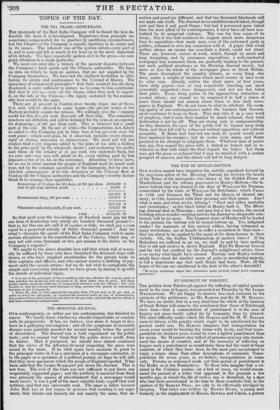TOPICS OF THE DAY.
THE TEA TRADE—DEMURRAGE.
THE monopoly of the East India Company will be found the less de- fensible the more it is investigated. Departures from principle are sometimes compensated for in practice by .modifying circumstances, but the Charter of the Company is equally injurious in its origin and in its issues. The inherent vice of the system infects every part of it, and is seen and felt as much in the least as in the most important of its details. We have repeatedly spoken of it in the gross—we now point attention to. a single particular. We need not enter into a history of the present disputes between the Company's local agents and the Chinese authorities. We have no data on which to form an opinion, that are not supplied by the Company themselves. We have not the slightest hesitation in attri- buting its origin and continuance to the Council at Macao. The ignorance Of commercial principles * that their conduct has all along displayed, is quite sufficient to induce us to come to this conclusion. But were it not. so,—were all the blame, when they seek to impute it, on the side of the Chinese,—the injury sustained by the commu- nity here would be the same. There are at present in Canton river twenty ships ; one of these, it is said, will be allowed to come home—the private wants of the - Factory probably require her release. We willingly give the i 'ompany credit for this five per cent. discount off their folly. The remaining nineteen are detained, and will be detained for the year, at an expense, for demurrage, of 30/. per diem each. This is however but a small part of the evil. By the act of 1784—the Commutation Act, falsely so called .1.—the Company put in their teas at ten per cent. over the cost price ; which cost price, be it observed, includes every charge, right or wrong, necessary or unnecessary. We need not tell our readers that every sixpence added to the price of tea adds a shilling to the price paid by the wholesale dealer ; and reckoning his profits and those of the retailer at 25 per cent. (we underrate them, but we care not—our case will admit of it), every shilling paid by him imposes a tax of ls. 3d. on the consumer. Attending to these facts, let us see to what amount the people of England must be taxed next year, not by the common operation of the monopoly, but by one in- cidental consequence of it—the detention of the Chinese fleet at Canton till the Chinese authorities and the Company's worthy factors think fit to arrange their squabbles.
Demurrage of 19 ships for 365 days, at 301. per diem £208,050 0 Add 10 per cent. allowed profit 20 805 0
228,855 0
Government-duty, 100 per cent. 228,855 0
457,710 0
Wholesale and retail profit, 25 per cent .. 114,427 10 Total . . . 1;572,137 10 So that next year the tea-drinkers of England must pay for this one item of demurfage very nearly six hundred thousand pounds !— that is, for this one act, call it of caprice or folly, we shall pay a sum equal to a perpetual annuity of thirty thousand pounds ! And for what ?—because the agents of the East India Company wish to make certain alterations in the constitution of the Cohong, which may or may not add some thousand or two per annum to the duties on the Company's exports ! We might to the above absolute loss add that which will of neces- sity be suffered by those who have furnished the detained ships with stores, or who have supplied merchandise for the private trade to their captains and officers, and who cannot receive a farthing of pay- ment until the vessels return : but we do not wish to complicate the simple and convincing statement we have given, by mixing it up with the details of individual injury.
* It is one of the principles of these worthies, that tea, whether the crop be good or bad, whether the market be well supplied or ill, shall never alter in price. Yet these people babble about the difficulty of transacting business with the Chinese ! The only wonder is, that the Chinese have tolerated so long, persons who persist in transacting business as the Company do.
1* When Mr. Pitt, in 1784, reduced the tea-duty from 116 per cent. to 12 per cent. in
order to crush the smugglers, he imposed the assessed taxes, by way of commutation. Succeeding Chancellors raised the tea-duty to hip per cent., and left the tax for which it had been commuted undiminished.


















 Previous page
Previous page